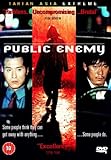Eye For Film >> Movies >> Public Enemy (2002) Film Review
In recent years Korean cinema has often been touted as the next big thing. Generally one remains unconvinced. There's a sense little is really distinctive about the films, which come across as a mix of Hollywood, Hong Kong and Japanese product looking for their place in the sun but not really offering any convincing reason as to why.
Public Enemy (Gonggongui jeog) is different, visibly trying to be a distinctively Korean genre film. But, unfortunately, it fails to ignite for this selfsame reason.
The story is a simple one with a high cliché count: A maverick cop - is there any other kind as far as filmmakers are concerned? - named Kang finds himself playing cat and mouse with a psychopathic yuppie, Jo, who has murdered his own parents when they threatened to withdraw an investment.
The actors playing the two men, Kying-gu Sol and Sung-jae Lee are household names in their country, while director Woo-suk Kang has established himself as someone who can blend genre filmmaking with social comment.
All good, but not counting for much outwith the home market. Worse, the social commentary aspects overload the piece with underdeveloped subplots as to who is the bigger Public Enemy - Brecht anyone? - and proves disastrous to the film's pacing and structure.
For the first 50 minutes we focus on Kang. Recruited into the force more for his boxing skills than anything else, he beats up suspects, openly consorts with gangsters and has a sideline in ripping off one group of drug dealers and selling their product to another. The internal affairs investigation is entirely warranted and a long time coming...
Jo gradually enters the mix, a control freak with a loving wife and child - who, having been introduced unfortunately play no further part in the narrative - and a tendency to kill anyone who threatens him with loss of face. (Wouldn't this have become evident long before? Or is being a psychopath a positive virtue in the world of business?)
After Kang and Jo have their first encounter - the way Jo gets the drop on Kang is unconvincing and out of character - Kang suddenly transforms into the de facto hero, his earlier crimes and misdemeanours largely forgotten. Or not quite, with the tone continuing to veer between grim seriousness, with the quest to prove Jo's guilty providing Kang with a shot at redemption, and black comedic, as when Kang gets a gangster associate to demonstrate how to kill someone with different kinds of blade.
You get the impression that a Hollywood-lite version would have established the characters of the two protagonists in 10 minutes, zeroed in on the conflict between them, left the messages to Western Union and ended up with a taut 100 minute thriller, instead of a 140 minute sprawling road accident.
A shame, for the performances are good, the direction intelligent - stylish without being all style - and the filmmakers to be applauded for their intentions in doing something other than just hybridising elements of American Psycho, Bad Lieutenant, Gang Related and - above all - Takeshi Kitano's assorted Violent Cops.
Reviewed on: 05 Apr 2004





















